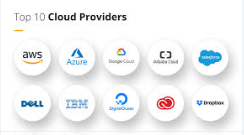In today’s fast-moving digital landscape, selecting the best cloud platform for business is mission-critical. Whether your organization prioritizes scalability, AI innovation, hybrid flexibility, or cost-efficiency, the right cloud provider can accelerate growth and streamline operations. This guide walks you through the top contenders—including AWS, Microsoft Azure, Google Cloud, and others—and helps you match platform capabilities to your specific needs.
Top Cloud Providers Overview (H2)
Amazon Web Services (AWS) (H3)
AWS continues to dominate the cloud infrastructure scene with a 29–31% market share as of early 2025 CloudZeroChannel InsiderWikipedia. Its vast service catalog—spanning compute, storage, analytics, AI, IoT, and more—makes AWS a go-to for enterprises, fintechs, and global-scale applications GartnerSvitla SystemsProsperOpsWikipedia.
Pros: Unmatched global reach and feature depth.
Considerations: Complex interface and pricing. AWS EC2, for example, is highly reliable but can be hard to cost-manage TechRadarBarron’s.
Microsoft Azure (H3)
With approximately 22–25% share of the cloud market CloudZeroChannel InsiderBusiness Insider, Azure stands out through seamless integration with Microsoft ecosystems like Office 365 and Teams. It’s a strong match for enterprises needing hybrid cloud strategies via tools like Azure Arc and strong enterprise security frameworks Svitla Systemsgraphon.comCCI Training CenterBusiness Insider.
Google Cloud Platform (GCP) (H3)
Holding 12–13% of the market CloudZeroBusiness InsiderProsperOps, GCP excels in analytics, AI/ML, and open-source innovation—famous for Kubernetes, BigQuery, and Vertex AI Cast AISvitla Systemsgraphon.comInvestors. In Q2 2025, its revenue surged 32% year-over-year, driven by AI workloads Investors.
Other Noteworthy Platforms (H3)
Beyond the big three:
- IBM Cloud offers strong AI, bare-metal options, and enterprise-scale hybrid solutions GartnerWikipedia.
- Oracle Cloud Infrastructure (OCI) is ideal for heavy database and enterprise workloads ProsperOpsWikipedia.
- DigitalOcean and Kamatera are attractive to cost-sensitive and smaller-scale operations, offering simplicity and affordable IaaS alternatives TechRadarfluence.network.
- Tencent Cloud, mainly strong in Asia, is expanding globally with new regions like Saudi Arabia in 2025 Wikipedia.
Comparison Table (H2)
| Platform | Market Share | Strengths | Best For |
|---|---|---|---|
| AWS | ~30% | Services breadth, global scale | Global enterprises, fintech, streaming |
| Azure | ~22–25% | Hybrid, Microsoft integration | Large enterprises using Microsoft ecosystems |
| Google Cloud | ~12–13% | AI/ML & analytics, innovation | Data-driven, AI-focused organizations |
| IBM Cloud | — | Hybrid, bare-metal, enterprise tools | Enterprises with complex workloads |
| OCI | — | Databases, enterprise infrastructure | Mission-critical business applications |
| DigitalOcean | — | Simplicity, price transparency | Startups, SMBs, developers |
| Kamatera | — | Customizable IaaS, strong support | Performance-focused enterprises |
| Tencent Cloud | ~2% global | Regional expansion, cost-effective | Firms expanding in Asia & Middle East |
Trends and Growth Insights (H2)
Market and Growth Dynamics (H3)
AWS retains its top spot, but both Azure and GCP are growing rapidly Business InsiderInvestorsMarketWatch. In Q2 2025, enterprise spending on cloud infrastructure reached $99 billion—$20 billion higher than a year ago CRN.
AI as a Cloud Growth Engine (H3)
AI isn’t just hype—it’s fueling real growth. GCP’s cloud revenue leapt 32% in Q2, driven by sophisticated AI workloads Investors. Analysts expect AWS to see 21% of its revenue from AI-related workloads in 2025—GCP could see even higher ratios Barron’s.
Multi-cloud & Cost Strategy (H3)
Enterprises are adopting multi-cloud strategies for resilience and cost leverage Wikipedia. Some, like Finder, have migrated from AWS to GCP, cutting costs by over 50% The Australian.
How to Choose (H2)
- Define your priorities—Is your focus on AI, hybrid architecture, global scale, or cost?
- Evaluate integration needs—Azure suits Microsoft-heavy environments; GCP is ideal for data science-focused teams.
- Consider long-term path & lock-in—Think hybrid or multi-cloud to avoid vendor dependence.
- Budget wisely—Factor billing models, per-second pricing nuances, and cloud cost management tools (e.g. FinOps) Cast AInOps.
- Review compliance needs—Security and certifications differ across sectors, so align with your compliance requirements Svitla Systems.

Internal and External Links (H2)
Internal Links (placeholders):
- Cloud Cost Optimization Techniques for SMEs
- How to Build AI Workflows on the Cloud
- Benefits of Hybrid Cloud Strategies for Enterprises
External Authoritative Sources:
- Pricing comparisons between AWS, Azure, and GCP Cast AI.
- Market share and comparisons as of August 2025 Svitla Systems.
Conclusion
Picking the best cloud platform for business in 2025 depends on your industry, workload, and strategic goals. AWS remains the most versatile and widely adopted, Azure shines in hybrid enterprise scenarios, and GCP leads in AI and analytics. Don’t overlook alternatives like IBM or OCI for niche needs, or simpler players like DigitalOcean for agile teams.
